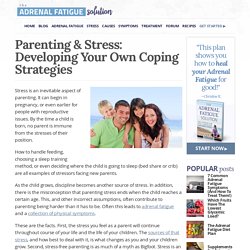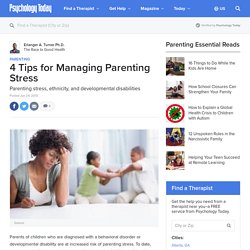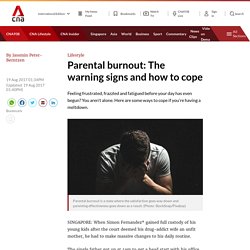

Emotional symptoms can include becoming easily agitated, feeling frustrated, feeling overwhelmed, mood changes, feeling like you are losing control and having difficulty relaxing your mind
Physical symptoms associated with stress can include headaches, upset stomach, diarrhea, constipation, nausea, aches, pains, tense muscles, chest pain and rapid heartbeat, insomnia, frequent colds and infections, loss of sexual desire and/or ability, nervousness and shaking, and clenched jaw and grinding teeth.
As a parents there are various forms of stress that one experiences and we will be examining this in this compilation.
Stress Symptoms, Signs, and Causes. In today’s fast-paced world, chronic stress is common, but your mind and body can pay a high price.

Learn to recognize overwhelming stress—and what you can do about it. What is stress? Stress is your body’s way of responding to any kind of demand or threat. When you sense danger—whether it’s real or imagined—the body’s defenses kick into high gear in a rapid, automatic process known as the “fight-or-flight” reaction or the “stress response.” The stress response is the body’s way of protecting you. Stress can also help you rise to meet challenges. If you frequently find yourself feeling frazzled and overwhelmed, it’s time to take action to bring your nervous system back into balance. Fight-or-flight response: what happens in the body When you feel threatened, your nervous system responds by releasing a flood of stress hormones, including adrenaline and cortisol, which rouse the body for emergency action. Stress.
Parenting & Stress: Developing Your Own Coping Strategies. Stress is an inevitable aspect of parenting.

It can begin in pregnancy, or even earlier for people with reproductive issues. By the time a child is born, no parent is immune from the stresses of their position. How to handle feeding, choosing a sleep training method, or even deciding where the child is going to sleep (bed share or crib) are all examples of stressors facing new parents. As the child grows, discipline becomes another source of stress.
In addition, there is the misconception that parenting stress ends when the child reaches a certain age. These are the facts. . #1 Establish support systems Establishing a support system early will lay a foundation for parents in the years to come. First, accept the help that is offered. Second, seek the help you need. If paying for outside help is out of the question, look to friends and family. . #2 Take the time to do fun things One of the best parts of being a parent is getting to have fun with your kids.
. #3 Corral the chaos Counselors Conclusion. Parenting Stress. Dr. Gabor Maté: Parental Stress and Its Impact on Kids. REVEALED: Top 20 most STRESSFUL things about being a parent. The average parent spends two hours every day feeling stressed A poll of 2,000 parents found the average mum and dad spend almost two hours a day feeling stressed, with trying to keep the house tidy the most common cause.

Others feel the strain at bath time, while trying to get children to behave in public and shopping for new clothes with the youngsters in tow. Mornings - complete with getting the children out of the door for the school run, persuading them to finish their breakfast and clean their teeth - are the most stressful time of the day, claiming five of the 10 top stresses. Dr Linda Papadopoulos, who has been working with belVita Breakfast to help relieve parents, particularly in the mornings, said: "The stress and challenges of parenting can feel overwhelming - especially when we feel under pressure to get a lot done in a short space of time.
Parenting Solutions - The Parent's Stress. Causes of parenting stress. 4 Tips for Managing Parenting Stress. Source: Parents of children who are diagnosed with a behavioral disorder or developmental disability are at increased risk of parenting stress.

Parental burnout: The warning signs and how to cope. SINGAPORE: When Simon Fernandez* gained full custody of his young kids after the court deemed his drug-addict wife an unfit mother, he had to make massive changes to his daily routine.

The single father got up at 4am to get a head start with his office work, woke the kids up a few hours later, got them ready, fed them, then dropped them off at school. He then travelled to work, but left early to send his kids to extra-curricular activities. All this while, Fernandez was on his phone managing his work obligations. In the evening, he prepared dinner, helped the kids with their homework, put the kids to bed and finished up his own work before hitting the sack. Fernandez did the same thing the next day, and the next and the next. US-based family therapist Neil D Brown shared this story to throw light on an epidemic many parents are silently suffering from ― parental burnout. By now, we already know that parenting is stressful.
Another culprit is technology and social media. How To Cope With Parenting Stress. Parents today juggle with many things in our fast paced life.

The parenthood journey is no walk in the park. Most of us strive to balance a million things while also being hands-on and connected with their children. Here are 6 ways you can do to cope and go beyond to establish firm bonds with your children. 1. Strong Family Support Many parents who seem to manage this intricate balance well attribute it to strong family support.
Even more so, some relatives or grandparents help out with housework or even day to day care! 2. Don’t sweat the small stuff. 3. The hard truth is that spending time has to be intentional. Coping with stress for parents.